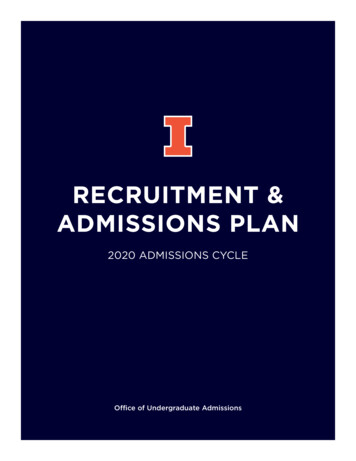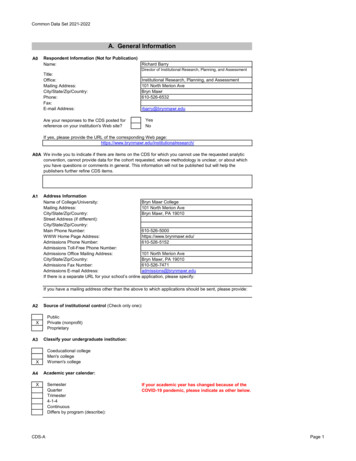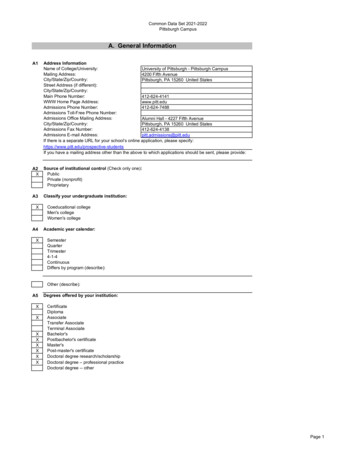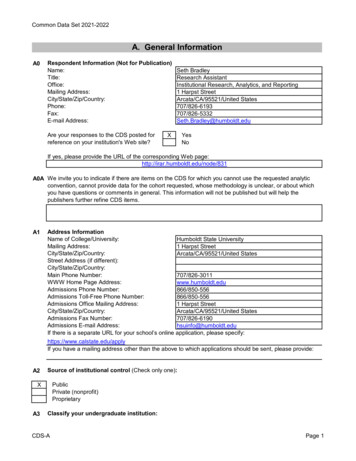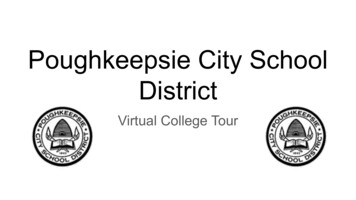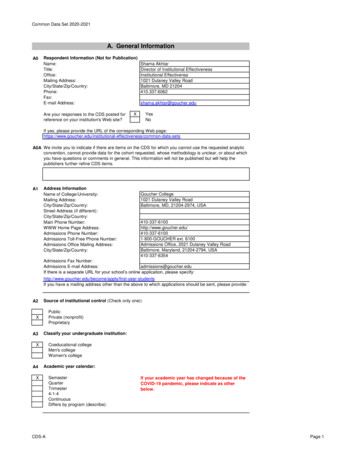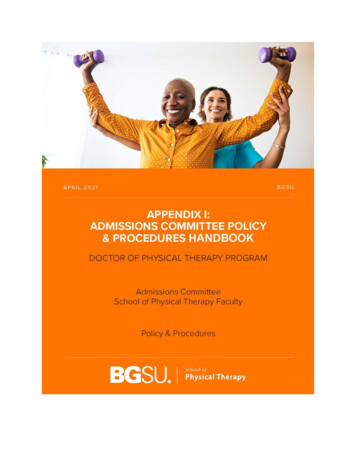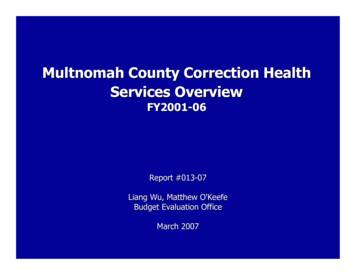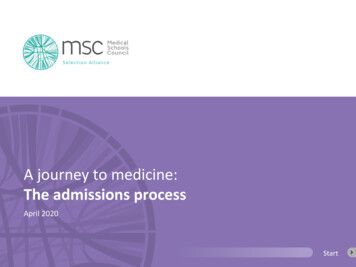
Transcription
A journey to medicine:The admissions processApril 2020Start
WHEN YOURSTUDENTSHEAR BACKA journey to medicine: The admissions processHow to use this bookletThis is the fourth of five booklets developed for teachersand advisers in secondary schools and colleges. This bookletprovides a guide to helping your students manage theadmissions process. The suggestions in this booklet areaimed at students aged 16 upwards.This booklet is particularly aimed at those schools andcolleges which have limited experience of supportingstudents in their application to medicine. It has beenproduced by the Medical Schools Council and is endorsed byall member undergraduate medical schools in the UK.As part of the student’s application to medicine they arelikely to need to complete an admissions test, and attendinterview. This booklet outlines the approaches that medicalschools use and how best to prepare your students.The information relates to UK medical schools only. It iscorrect and accurate at the time of publication (May 2018).It will be updated annually but we advise you to checkindividual medical school websites.A large proportion of medical schools use contextualinformation to help them assess the student in terms of theirsocial and educational background. This booklet explainshow medical schools use contextual information.The Medical Schools Council’s resources for students andteachers or advisers is available online.Visit s/resources-for-students-and-teachers for moreinformation.After a student has heard back from the medical schoolsthere are often further decisions for them to take, like whereto attend or what to do if they receive no offers. This bookletwill guide you through the options available to your students.A journey to medicine: The admissions process1May 2018
WHEN YOURSTUDENTSHEAR BACKContentsAdmissions tests3 BMAT UCAT GAMSATInterviews6 Types of interviews How to prepareContextual informationWhen your students hear back910 Receiving an offer Receiving no offersA journey to medicine: The admissions process2May 2018
WHEN YOURSTUDENTSHEAR BACKAdmissions testsAll medical schools use an admissions test to helpthem assess a student’s aptitude for medicineand a future career as a doctor. The tests havebeen designed to help medical schools determinewhether applicants have the best combinationof cognitive abilities, attitudes and professionalbehaviour appropriate for an aspiring doctor.They can be used to: Decide whether to invite a student to interview Inform whether an offer should be made Decide between two equally ranked applicantsMany medical schools use thresholds and require that acandidate’s score be over a particular threshold. Thesethresholds change year on year and can be influenced byother factors, such as socio-economic and educationalcontext.Every medical school will detail on their website how thetests will be used within the admissions process.The tests used by medicine in the UK are the UniversityClinical Aptitude Test (UCAT) and the Biomedical AptitudeTest (BMAT). There is also the Graduate Australian MedicalSchool Admissions Test (GAMSAT), which can be used forgraduate entry.Medical schools will require all applicants to sit anaptitude test.Most test results are only valid in the year that the test istaken and cannot be carried over to a re-application.Likewise, a candidate’s score from one year will not affecttheir chances if re-applying in later years, as each applicationis considered afresh.Both tests have a fee associated with them but do havebursaries to support those students from low-incomehouseholds.It is essential that students practise the tests and becomefamiliar with the type of questions, format and timeconstraints. Some parts of the tests will be weighteddifferently, so ensure your students know the weightings sothey can focus their time accordingly. The best preparationis to encourage your students to complete the practicepapers under examination conditions. UCAT reports that themost successful candidates spend around 21 to 30 hourspreparing for the test.Both the UCAT and BMAT have guidance notes and freepractice papers available on their websites. Many medicalschools can also offer support to your students. Anyoneoffering a paid service to help your students prepare for thetests will have no more knowledge than someone who hasread the information on the website and studied pastpapers. So while a student’s performance at any test willimprove with some familiarisation or practice, advice fromthe medical schools is that you do not need to pay anyonefor such help.The deadlines for registration and completing the testcan be early in the year, so encourage your students toregister early.A journey to medicine: The admissions process3May 2018
WHEN YOURSTUDENTSHEAR BACKAdmissions testsBMATUCATGAMSATThe Biomedical Admissions Test is a paper-based two-hourtest for students. The BMAT assesses mathematical andscientific knowledge alongside thinking skills and writtencommunication. It has separate papers that test:The UK Clinical Aptitude Test is designed to test the mentalabilities, attitudes and the professional behaviour required ofnew doctors. It is a two-hour computer-based test which canbe taken at centres across the UK and worldwide. It includessubtests involving verbal reasoning, decision-making,quantitative reasoning, abstract reasoning and situationaljudgement.This test is used only for a number of the Graduate EntryMedicine courses, and not for Standard Entry Medicine. Assuch it is not a test that school leavers need to know about.Seven medical schools use the GAMSAT. Generic skills in problem solving and critical thinking The ability to apply the scientific knowledge typicallycovered in school science and mathematics by the age of16 The ability to select, develop and organise ideas, and tocommunicate them in writing, concisely and effectivelyRegistration opens in May and closes by mid-September.Students can take the test from July until the beginning ofOctober. Check the current dates on the website.GAMSAT evaluates the nature and extent of abilities andskills gained through prior experience and learning, includingthe mastery and use of concepts in basic science as well asthe acquisition of more general skills in problem solving,critical thinking and writing.Tests are undertaken in school (if it is an authorised testcentre) or at one of the centres located across the UK.There are two registration deadlines. You need to register inAugust to sit the test in September or register in October tosit the test in November. Students sit the test on the sameday in September or late October/early November. Resultsare sent directly to the medical schools that students haveindicated they are applying to. Check the current dates onthe website.A journey to medicine: The admissions process4May 2018
WHEN YOURSTUDENTSHEAR BACKAdmissions testsThe most useful preparation you can do for anadmissions test is practice. You need to be willing toput in a significant amount of work. However, youdon’t need to pay for specialist courses and support;the test providers have lots of advice and othermaterials on their websites, including practice exampapers. Reading example questions and completingpractice exam papers allows you to become familiarwith the format of the questions, and trains youto recognise quickly what questions are actuallyasking you to do. It is particularly helpful to carryout practice exam papers under the same timeconstraints that you will face in the real exam, to getyou used to the pace at which you need to answerquestions in order to complete on time.”For more informationProfessor Kevin Murphy, Admissions Tutor for WideningParticipation in Medicine, Imperial College London Video informationTo find out more about the tTo find out more about UCAT:www.ucatofficial.comTo find out more about GAMSAT:https://gamsat.acer.orgStudent activity50 minutesAsk your students to work in three groups. Using the BMATor UCAT website, ask a group to look at one of the followingelements of the preparation guidance: The guidebook Practice questionsAsk the students to write down Their top five tips for other students from looking at theresources The most surprising thing they learned about the test What their next steps will be to prepare for the testA journey to medicine: The admissions process5May 2018
WHEN YOURSTUDENTSHEAR BACKInterviewsInterviews allow medical schools to further assessthe applicants.At interview medical schools are looking for anapplicant’s:Following the initial sift of applications, the applicants inwhom the medical school is interested will be invited tointerview. All medical schools (apart from the Universityof Edinburgh Medical School) interview school leavers. Ifan applicant is invited to interview but does not attend,they cannot be offered a place. Most interviews will takeplace in January or February, but some can start as early asDecember. Ability to communicateApplicants should be able to express their ideas clearly andcoherently and to be able to follow a reasoned argument.Applicants who give spontaneous yet well thought-outanswers to questions are more likely to impress theinterviewers than those who give obviously rehearsed and‘coached’ responses.On the day of interview, applicants will often have theopportunity to look around the school of medicine and meetsome of the current medical students. The interview will bea formal, though friendly, process. The interviewers couldbe practising clinicians, academic staff, medical students orpatients. The interview is not a test of academic knowledgebut more on the suitability and aptitude to study medicineand become a doctor.Medical schools appreciate that some candidates will benervous and will, of course, make allowances for this.If a student is unwell on the day of the interview then dolet the medical school know. They will often be able toreschedule it. AttitudeMedical schools look to see if applicants have the rightattitudes to study medicine and be a doctor. This includesflexibility, integrity and conscientiousness. Motivation to be a doctorMedical schools will want to see evidence of theexperiences that have influenced an applicant’s decision tostudy medicine. They will want to know that an applicanthas an understanding of what a career in medicine entails. Previous caring experienceThis can be from an applicant’s work, home or voluntaryexperience. Medical schools will not only want to hearabout the type of experience but also what an applicanthas learned and their emotional response.The setting for the interview may vary. Some medical schoolswill interview in a boardroom or office, others will use a largeroom with several interviews taking place at the same time,others may use lounge areas.Before any interview encourage your students to: Research the type of interview used by the medical school Learn about the medical school, the university and itslocation, including what makes them different from others Be self-reflective and think about their skills, abilities andinterests Re-read their personal statementMedical schools know that interviews can be daunting.Encourage your students at interview to: Be confident. Just being invited to interview is a hugeachievement. Encourage your students to see this as anopportunity to demonstrate their interest and enthusiasmabout studying medicine. Address all interviewers, and not focus on one Be themselves. Coached or overly rehearsed answers willnot come across as well as more spontaneous but wellconsidered answers. Knowledge of what is happening within medicineApplicants will not be expected to have a detailedknowledge but have an intelligent layperson’s view onareas of medicine that are currently within the media or inthe spotlight. It is important that applicants demonstratean awareness of scientific and medical issues. Medicalschools will want to see the applicant’s intellectualpotential.A journey to medicine: The admissions process6May 2018
WHEN YOURSTUDENTSHEAR BACKTypes of interviewsThere are many different types of interview.Medical schools may use different types ofinterviews during the day. The approach used bythe medical school will be detailed on its website.Encourage your students to check the medicalschools’ websites, many provide guidance to helpyour students prepare.Panel interviewsApplicants will be interviewed by at least two interviewers.The types used by medical schools are detailed below.We are looking for sound all-round talent.Applicants come across best when genuine, ableto engage in discussions effectively and not highlygroomed or rehearsed. It is the quality of thediscussion, not any ‘correct’ answer that is scored.Though a student who has not thought about orcannot convincingly expand upon aspects of theirUCAS statement will not come across well. Hence,prior consideration of what the candidate wantsto convey as their strengths and some practiceformulating their responses, for instance withfriends and family, should be strongly encouraged.Similarly, questions exploring their reasons forchoosing a medical career etc. can be predicted, sosome preparation helpful. Note this should be theirreasons, there is no ideal response.”Multiple mini-interviewsThe most common type of interview format used by medicalschools is the multiple mini-interview. Its questions andtasks have been designed to gain further insight into theapplicant’s personal qualities and their cognitive skills.Applicants are interviewed in a number of stations (usuallyseven or eight). Each station will last only a few minutes(often less than 10 minutes).The stations may seek to understand further the applicant’s: Motivation to study medicine as a career Communication skills Problem solving ability Capacity for self-reflection Capacity for logical thinking Understanding of professional responsibility Capacity for team workingApplicants may have more than one panel interview in aday. Panel interviews may consist of questions about anapplicant’s abilities or skills, or they may be presented withdifferent scenarios that they will be encouraged to discuss.Professor Jon Dowell,Previous Admissions Convener, Dundee Medical School Ability to discuss issues of a wider nature in the field ofmedicineA journey to medicine: The admissions process7May 2018
WHEN YOURSTUDENTSHEAR BACKHow to prepareMany students get nervous ahead of their interview. Somepreparation can help allay your students’ nerves.It is also helpful if you can support your students by: Providing interview tips Setting up mock interviews. This can be with friends,family and other staff. The most important thing is thatstudents get used to talking about themselves andexpressing their views. Encouraging students who are at medical school to speakto your students. Many medical schools can help toarrange this. Encouraging students to feedback and reflect on areas forimprovement after every interviewA month to two weeks before the interview, encourage yourstudents to: Research the medical course, its structure, the type ofteaching and assessment, and any additional opportunitiesit provides Follow any medical developments making the news orwithin dedicated journals (such as the British MedicalJournal)A week before the interview, encourage your students to:On the day, encourage your students to:For more information Be confident in their own abilities – they have done well toget this farMost medical schools will have information about the typesof interview they have and how best to prepare for them.For more general information visit the UCAS website:www.ucas.com/interview-tips. Have a copy of the interview invitation to hand as this willoften include directions and a contact number in case ofemergencies Arrive in plenty of time Wear smart, clean clothes. No jeans or ripped clothing.Ask them to imagine how they would expect a doctor todress. Take some water and snacks Listen to any briefing and read any instructions carefully Breathe and stay calmAfter the interview, encourage your students to reflect onthe interview on the journey home, to help them prepare forfuture interviews. Ask them to consider what they felt theydid well in and what they could improve on.Some medical schools may ask the applicants attendinginterview not to disclose the questions or the details of thestations. This is to ensure that all applicants are treatedequally and some do not have an unfair advantage.Student activity50 minutesAsk your students to work in groups of three or four. Askthem to consider their answers to the following questions.Encourage them to think about how their responsesdemonstrate their understanding of medicine as a career,and their skills and aptitude for the subject and profession. During work experience what was the most importantthing you learned about yourself? Why did you choose this medical school and university? What elements of medicine particularly interest you?Ask them to give their top five tips for banishing nervesbefore the interview. Make sure they know where the interview is and how toget there Re-read their personal statement. They may get askedquestions about it. Read up about the university and its location. Think of some questions they may wish to ask at interviewA journey to medicine: The admissions process8May 2018
WHEN YOURSTUDENTSHEAR BACKContextual informationMany medical schools use contextual informationin order to understand a student’s social oreducation background. It enables them to gauge anapplicant’s academic potential.There are many contextual factors that may be usedby the medical school. The two main factors used bymedical schools are consideration of the: Education background of the studentThere are a range of factors that can be used such asschool achievement data (for example, the average GCSE(or equivalent) performance of students at the school orthe number of students progressing to higher education)or the composition of the school (for example, thepercentage receiving free school meals).Medical schools may use contextual information in differentways. It may help to inform whether to: Invite a student to interview Consider the test or interview scores within the student’seducation or social context Provide an offer for an access route or alternative pathwayto medicine Give further consideration to the application if the studentjust misses the grades they were predictedMedical schools list the contextual information they take intoaccount on their websites. Socio-economic background of the studentThis may include an assessment of the level ofdisadvantage a student may have faced (using the indexof multiple deprivation) or their family background (usingincome or social class assessments).Contextual admissions looks at an applicant’sacademic achievements in the context of theireducational and social environments. Certainmedical schools use one or more of a variety offactors such as the area an applicant lives in orthe school they attended to assess context. Muchof this information is available from UCAS formsbut some medical schools require additionalinformation directly from the applicants. Additionalconsideration may be given to particular factorssuch as the region the applicant comes from orattendance at particular outreach events. It isimportant when applying to a course that usescontextual admissions to check whether the factorsare relevant to your students.”Dr Sally Curtis, BM6 Programme Lead,Faculty of Medicine, University of SouthamptonThe majority of the contextual factors used by the medicalschools will be identified automatically, using publiclyavailable information provided by the Department forEducation (or others) about the school, or information basedon where the student lives.Some medical schools may ask for additional information,for example, if the student has been in care. This should beincluded in the UCAS application form. Check websites to seewhat information individual medical schools consider.A journey to medicine: The admissions process9May 2018
WHEN YOURSTUDENTSHEAR BACKWhen your students hear backStudents applying for undergraduate medicalschool programmes will apply through UCAS. UCASTrack will enable them to follow the progress oftheir application online.At interview, most medical schools will let students knowwhen they will hear about the outcome of their application.Medical schools are allocated a specific number of placesby the Department of Health. The number of offers eachmedical school makes will be calculated in reference toprevious years’ intake statistics and conversion rates.Receiving an offerThe offer will outline the entry requirements including thegrades needed.Most of your students will receive a conditional offer.The conditional offer will outline the grades and subjectsrequired. For medicine there are likely to be other conditionssuch as a Disclosure and Barring Service check that isdeemed satisfactory by the medical school and healthchecks.For students who have received an offer, they will then needto decide what course to make their firm choice and what tohave as their insurance choice. It may be difficult for studentsto decide between different offers for medicine, as theymay be very similar. However, encourage your students toconsider the entire offer as there may be differences.A journey to medicine: The admissions processReceiving no offersThis can be very disappointing for students. There are2.5 applicants for every place at medical school so manystudents will not get the news they want. Of those whoreceive a positive response, many will only have been calledfor one or two interviews.If your student received no interviews, it may be that theirapplication was not competitive in either their predictedor achieved academic grades, or their performance in theaptitude test was not high enough for competitive selection.If unsuccessful at the interview stage, encourage yourstudent to request feedback. Most medical schools willexplain how to seek feedback on their website. The feedbackmay not be very detailed but can help to provide anindication as to why the student did not receive an offer forinterview.Your student can enter UCAS Extra or Clearing. The placesavailable in UCAS Extra or Clearing will be extremely limited(if there are any at all). There are likely to be vacancies inother health courses.If a student still wishes to study medicine they shouldconsider what they would need for the best chance ofa successful application next year. It will be importantthat their A level (or equivalent) grades meet theentry requirements. Encourage them to focus on theirexaminations. Following their examinations they can focuson gaining additional experience and building their skills.This should include practising the aptitude test and carefullyconsidering the selection process of each medical school. Ifthey are reapplying to the same medical school they shouldcheck whether reapplications are allowed.10May 2018
WHEN YOURSTUDENTSHEAR BACKWhen your students hear backFor more informationI would always encourage students who do notreceive an offer of a place the first time aroundto try and try again. Students taking two or threeattempts to gain a place are not uncommon.Remember you are a doctor for a lifetime, so it isdefinitely worth it. Through perseverance, studentsdevelop many important qualities, such as resilienceand the ability to reflect when unsuccessful whichare considered essential qualities by both medicalschools and in the medical profession. Below isa quote from Michael a year three student atPeninsula Medical School, who gained a place onthe third attempt; he was from a school in specialmeasures.UCAS Clearing: tion-clearing-and-adjustment-toolkitadvisers.UCAS Extra: ck-your-application/extra-choices.UCAS Track: www.ucas.com/adviser-track-and-reporting.Student activity50 minutesFor those students who have not received an offer formedicine it can be a very difficult time. Encourage yourstudents to consider their options.Ask your students to spend some time reflecting onwhether they still wish to study medicine. There are manyother courses available, in healthcare, science, engineeringor other areas. Ask your students to reconsider theirreasons for studying medicine and ask themselves:‘My journey into medicine contained muchuncertainty. After facing a number of unsuccessfulapplications, it led to a developed resilience. Thisresilience led me to not give up, and to overcomethe obstacles faced.’” Are they interested in any other courses? Why did they apply to medicine?Dr Louise Alldridge, Associate Professor Biomedical Sciencesand Widening Participation Lead, Plymouth University Peninsula Schools of Medicine and DentistryIf they still wish to consider medicine, ask your studentsto consider their application and any feedback they havereceived: What are the areas they need to improve on? How could they improve on their application, interviewor test performance?At the end of the session if students are still keen tostudy medicine, encourage them to focus on theirexaminations. They can build up their experiences aftertheir examinations.A journey to medicine: The admissions process11May 2018
The Medical Schools Council represents theinterests and ambitions of UK medical schoolswww.medschools.ac.ukWritten by Nursaw Associateswww.nursawassociates.comDesigned by Wax DesignWorks Limitedwww.waxdesignworks.co.uk
A journey to medicine: The admissions process 6 Interviews allow medical schools to further assess the applicants. Following the initial sift of applications, the applicants in whom the medical school is interested will be invited to interview. All medical schools (apart from the University of Edinburgh Medical School) interview school leavers. If



